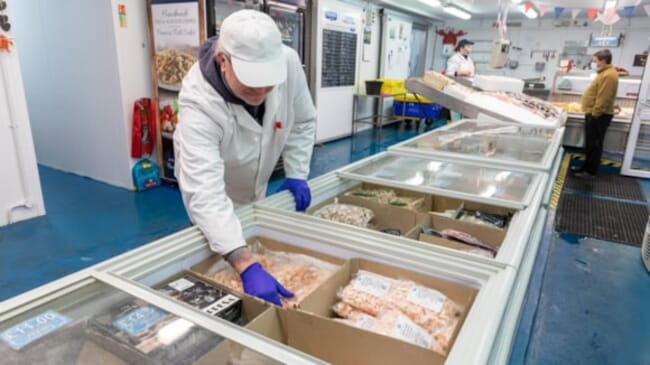
© Seafish
Called
the Seafood Carbon
Emissions Profiling Tool, it aims to help businesses measure and
reduce their products’ carbon footprint and contribute to meeting net-zero
targets.
The tool allows seafood businesses to sign-up and access an online platform where they can input their supply chain data, such as greenhouse gas emissions associated with processing operations.
Product carbon footprints can then be generated, and potential hotspots identified, providing the data needed to allow those businesses to address carbon-related issues in their supply chain.
The development has been funded jointly by the Fisheries and Seafood Scheme (FaSS) in England, and Seafish and developed by Mérieux NutriSciences/Blonk, a leading international expert in food systems sustainability.
Seafish’s head of responsible sourcing, Stuart McLanaghan, described how the tool can support businesses working to reduce their carbon footprint.
As he said in a press release: “The Seafood Carbon Emissions Profiling Tool is an important part of our work to support the UK seafood sector transition to net-zero.
“It is aimed at the entire UK seafood supply chain, but we envisage that buyers within retail, food service and processing will be amongst the main users.
“The tool provides several benefits for industry but will first and foremost enable industry to identify carbon footprints for their seafood products and understand the hotspots or risks in their supply chains. This is important as robust data and information are needed to help businesses plan and make informed investment decisions to drive transformation to accelerate the decarbonisation of shared seafood supply chains, including via pre-competitive collaboration.”
Industry support
UK-based seafood importer, processor and distributor, New England Seafood, is one organisation supporting the development.
Cassie Leisk, the company’s people and planet group director, said: “The tool is easy to use, it’s really intuitive. You don’t need to have a lot of carbon knowledge or expertise to be able to access it. The whole point of the tool is it’s something anyone in the business can use whether you’re working on sustainability, working specifically on carbon, if you’re a CEO or working in ops.
“For me it’s something that’s helpful to translate some quite detailed, technical information into something simple for anybody to access.”
The tool builds on Seafish’s two previous carbon profiling tools which enabled companies to evaluate the carbon impact of their wild capture seafood products.
Another organisation already familiar with how it can help businesses work towards their own carbon related targets is one of the UK’s major retailers, Tesco.
Ben Lambden, Tesco’s sustainable fisheries and aquaculture manager, said: “It enables us to baseline carbon completely through the supply base - so at primary, at wild capture and aquaculture, enabling us to really understand where we’re at and how we can best reach our targets.
“The beauty of the tool is it’s continuously developing so, as you continue to use it, more data will be added and reviewed and it should get easier to use.”


